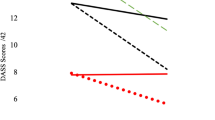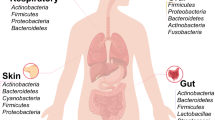Abstract
Background/objectives
There is a growing body of evidence that supports the potential role of fish consumption in relation to depression, but the data in Korean population is scarce. Thus, we examined the association between fish consumption and depression in Korean adults.
Subjects/methods
We conducted a cross-sectional study in 9183 Korean adults aged 19–64 years who participated in the 6TH Korea National Health and Nutrition Examination Survey (2013–2015), which is a large nationally representative study of Korean population. Fish consumption and depression status were assessed using questionnaires. Multivariable logistic regression models were used to compute odds ratios (ORs) and 95% confidence intervals (CIs) for physician-diagnosed clinical depression.
Results
Out of the 9183 subjects, 389 (4.2%) were diagnosed with depression. After adjusting for potential confounders, the multivariable-adjusted ORs for clinical depression across fish consumption were 1.00 (reference) for <1 time/week, 0.76 (95% CI: 0.56–1.04) for 1–3 times/week and 0.52 (95% CI: 0.37–0.74) for ≥4 times/week (P for trend = 0.0005). The inverse association for ≥4 times/week of fish consumption was stronger in women (OR = 0.44, 95% CI: 0.29–0.67, P for trend < .0001), but there was no significant association in men.
Conclusions
Our findings suggest that high consumption of fish is associated with lower odds of depression in Korean adults, particularly in women. These results warrant further prospective studies to verify the association between fish consumption and risk of depression in Korean adults.
This is a preview of subscription content, access via your institution
Access options
Subscribe to this journal
Receive 12 print issues and online access
$259.00 per year
only $21.58 per issue
Buy this article
- Purchase on Springer Link
- Instant access to full article PDF
Prices may be subject to local taxes which are calculated during checkout
Similar content being viewed by others
References
World Health Organization. Depression and other common mental disorders—global health estimates. http://apps.who.int/iris/bitstream/10665/254610/1/WHO-MSD-MER-2017.2-eng.pdf?ua=1. Accessed 10 March 2017.
Global Burden of Disease (GBD) Results Tool 2015. http://ghdx.healthdata.org/gbd-results-tool. Accessed 20 March 2017.
Jeon HJ, Lee JY, Lee YM, Hong JP, Won SH, Cho SJ, et al. Lifetime prevalence and correlates of suicidal ideation, plan, and single and multiple attempts in a Korean nationwide study. J Nerv Ment Dis. 2010;198:643–46.
Krogh J, Nordentoft M, Sterne JA, Lawlor DA. The effect of exercise in clinically depressed adults: systematic review and meta-analysis of randomized controlled trials. J Clin Psychiatry. 2011;72:529–38.
Zhai L, Zhang Y, Zhang D. Sedentary behaviour and the risk of depression: a meta-analysis. Br J Sports Med. 2015;49:705–9.
Li Y, Lv MR, Wei YJ, Sun L, Zhang JX, Zhang HG, et al. Dietary patterns and depression risk: A meta-analysis. Psychiatry Res. 2017;253:373–82.
Li F, Liu X, Zhang D. Fish consumption and risk of depression: a meta-analysis. J Epidemiol Commun Health. 2016;70:299–4.
Grosso G, Micek A, Marventano S, Castellano S, Mistretta A, Pajak A, et al. Dietary n-3 PUFA, fish consumption and depression: a systematic review and meta-analysis of observational studies. J Affect Disco. 2016;205:269–81.
Su KP. Biological mechanism of antidepressant effect of omega-3 fatty acids: how does fish oil act as a “mind-body inerface”? Neurosignals. 2009;17:144–52.
Tanskanen A, Hibbeln JR, Tuomilehto J, Uutela A, Haukkala A, Viinamaki H, et al. Fish consumption and depressive symptoms in the general population in Finland. Psychiatr Serv. 2001;52:529–31.
Hakkarainen R, Partonen T, Haukka J, Virtamo J, Albanes D, Lonnqvist J. Is low dietary intake of omega-3 fatty acids associated with depression? Am J Psychiatry. 2004;161:567–69.
Timonen M, Horrobin D, Jokelainen J, Laitinen J, Herva A, Rasanen P. Fish consumption and depression: the Northern Finland 1966 birth cohort study. J Affect Disco. 2004;82:447–52.
Barberger-Gateau P, Jutand MA, Letenneur L, Larrieu S, Tavernier B, Berr C. Correlates of regular fish consumption in French elderly community dwellers: data from the Three-City study. Eur J Clin Nutr. 2005;59:817–25.
Kamphuis MH, Geerlings MI, Tijhuis MA, Kalmijn S, Grobbee DE, Kromhout D. Depression and cardiovascular mortality: a role for n-3 fatty acids? Am J Clin Nutr. 2006;84:1513–17.
Astorg P, Couthouis A, Bertrais S, Arnault N, Meneton P, Guesnet P, et al. Association of fish and long-chain n-3 polyunsaturated fatty acid intakes with the occurrence of depressive episodes in middle-aged French men and women. Prostaglandins Leukot Essent Fattty Acids. 2008;78:171–82.
Colangelo LA, He K, Whooley MA, Daviglus ML, Liu K. Higher dietary intake of long-chain omega-3 polyunsaturated fatty acids is inversely associated with depressive symptoms in women. Nutrition. 2009;25:1011–19.
Suominen-Taipale AL, Partonen T, Turunen AW, Mannisto S, Jula A, Verkasalo PK. Fish consumption and omega-3 polyunsaturated fatty acids in relation to depressive episodes: a cross-sectional analysis. PLoS ONE. 2010;5:e10530.
Chrysohoou C, Tsitsinakis G, Siassos G, Psaltopoulou T, Galiatsatos N, Metaxa V, et al. Fish consumption moderates depressive symptomatology in elderly men and women from the IKARIA Study. Cardiol Res Pract. 2011;2011:219578.
Li Y, Dai Q, Ekperi LI, Dehal A, Zhang J. Fish consumption and severely depressed mood, findings from the first national nutrition follow-up study. Psychiatry Res. 2011;190:103–9.
Lucas M, Mirzaei F, O'Reilly EJ, Pan A, Willett WC, Kawachi I, et al. Dietary intake of n-3 and n-6 fatty acids and the risk of clinical depression in women: a 10-year prospective follow-up study. Am J Clin Nutr. 2011;93:1337–43.
Albanese E, Lombardo FL, Dangour AD, Guerra M, Acosta D, Huang Y, et al. No association between fish intake and depression in over 15,000 older adults from seven low and middle income countries—the 10/66 study. PLoS ONE. 2012;7:e38879.
Hoffmire CA, Block RC, Thevenet-Morrison K, van Wijngaarden E. Associations between omega-3 poly-unsaturated fatty acids from fish consumption and severity of depressive symptoms: an analysis of the 2005–2008 National Health and Nutrition Examination Survey. Prostaglandins Leukot Essent Fat Acids. 2012;86:155–60.
Tsai AC, Chang TL, Chi SH. Frequent consumption of vegetables predicts lower risk of depression in older Taiwanese—results of a prospective population-based study. Public Health Nutr. 2012;15:1087–92.
Smith KJ, Sanderson K, McNaughton SA, Gall SL, Dwyer T, Venn AJ. Longitudinal associations between fish consumption and depression in young adults. Am J Epidemiol. 2014;179:1228–35.
Hamazaki K, Natori T, Kurihara S, Murata N, Cui ZG, Kigawa M, et al. Fish consumption and depressive symptoms in undergraduate students: a cross-sectional analysis. Eur Psychiatry. 2015;30:983–87.
Wu D, Feng L, Gao Q, Li JL, Rajendran KS, Wong JC, et al. Association between fish intake and depressive symptoms among community-living older chinese adults in Singapore: a cross-sectional study. J Nutr Health Aging. 2016;20:404–7.
Korea Center for Disease Control and Prevention Korea National Health and Nutrition Examination Survey. http://knhanes.cdc.go.kr. Accessed 10 Feb 2017.
Kim DW, Song S, Lee JE, Oh K, Shim J, Kweon S, et al. Reproducibility and validity of an FFQ developed for the Korea National Health and Nutrition Examination Survey (KNHANES). Pub Health Nutr. 2015;18:1369–77.
Berk M, Sarris J, Coulson CE, Jacka FN, Lifestyle management of unipolar depression. Acta Psychiatr Scand Suppl.2013;127:38–54.
Ainsworth BE, Haskell WL, Whitt MC, Irwin ML, Swartz AM, Strath SJ, et al. Compendium of physical activities: an update of activity codes and MET intensities. Med Sci Sports Exerc. 2000;32:S498–4.
Yu M, Zhang X, Lu F, Fang L, Depression and risk for diabetes: a meta-analysis. Can J Diabetes. 2015;39:266–72.
Wu Q, Kling JM. Depression and the risk of myocardial infarction and coronary death: a meta-analysis of prospective cohort studies. Medicine. 2016;95:e2815.
Dong JY, Zhang YH, Tong J, Qin LQ. Depression and risk of stroke: a meta-analysis of prospective studies. Stroke. 2012;43:32–37.
Chen YH, Lin HC. Increased risk of cancer subsequent to severe depression—a nationwide population-based study. J Affect Disco. 2011;131:200–6.
Giltay EJ, Gooren LJ, Toorians AW, Katan MB, Zock PL. Docosahexaenoic acid concentrations are higher in women than in men because of estrogenic effects. Am J Clin Nutr. 2004;80:1167–74.
Delion S, Chalon S, Herault J, Guilloteau D, Besnard JC, Durand G. Chronic dietary alpha-linolenic acid deficiency alters dopaminergic and serotoninergic neurotransmission in rats. J Nutr. 1994;124:2466–76.
Arora RC, Meltzer HY. Serotonergic measures in the brains of suicide victims: 5-HT2 binding sites in the frontal cortex of suicide victims and control subjects. Am J Psychiatry. 1989;146:730–36.
Stanley M, Mann JJ. Increased serotonin-2 binding sites in frontal cortex of suicide victims. Lancet. 1983;1:214–16.
Hibbeln JR, Linnoila M, Umhau JC, Rawlings R, George DT, Salem N Jr.. Essential fatty acids predict metabolites of serotonin and dopamine in cerebrospinal fluid among healthy control subjects, and early and late-onset alcoholics. Biol Psychiatry. 1998;44:235–42.
Bhattacharya A, Sun D, Rahman M, Fernandes G. Different ratios of eicosapentaenoic and docosahexaenoic omega-3 fatty acids in commercial fish oils differentially alter pro-inflammatory cytokines in peritoneal macrophages from C57BL/6 female mice. J Nutr Biochem. 2007;18:23–30.
Heller A, Koch T, Schmeck J, van Ackern K. Lipid mediators in inflammatory disorders. Drugs. 1998;55:487–96.
Valkanova V, Ebmeier KP, Allan CL. CRP, IL-6 and depression: a systematic review and meta-analysis of longitudinal studies. J Affect Disco. 2013;150:736–44.
Saada HN, Said UZ, Mahdy EM, Elmezayen HE, Shedid SM. Fish oil omega-3 fatty acids reduce the severity of radiation-induced oxidative stress in the rat brain. Int J Radiat Biol. 2014;90:1179–83.
Black CN, Bot M, Scheffer PG, Cuijpers P, Penninx BW. Is depression associated with increased oxidative stress? A systematic review and meta-analysis. Psychoneuroendocrinology. 2015;51:164–75.
Acknowledgements
We thank the participants and staff of the Korea Centers for Disease Control for their dedication and commitment. This work was supported by the Basic Science Research Program through the National Research Foundation of Korea, funded by the Ministry of Science, ICT and Future Planning (NRF-2015R1A1A1A05001362). Funders had no role in the study design, data collection and analysis, decision to publish, or preparation of the manuscript.
Funding
This work was supported by the Basic Science Research Program through the National Research Foundation of Korea, funded by the Ministry of Science, ICT and Future Planning (NRF-2015R1A1A1A05001362). Funders had no role in the study design, data collection and analysis, decision to publish, or preparation of the manuscript.
Author information
Authors and Affiliations
Corresponding author
Ethics declarations
Conflict of interest
The authors declare that they have no conflict of interest.
Electronic supplementary material
Rights and permissions
About this article
Cite this article
Yang, Y., Je, Y. Fish consumption and depression in Korean adults: the Korea National Health and Nutrition Examination Survey, 2013–2015. Eur J Clin Nutr 72, 1142–1149 (2018). https://doi.org/10.1038/s41430-017-0083-9
Received:
Revised:
Accepted:
Published:
Issue Date:
DOI: https://doi.org/10.1038/s41430-017-0083-9



